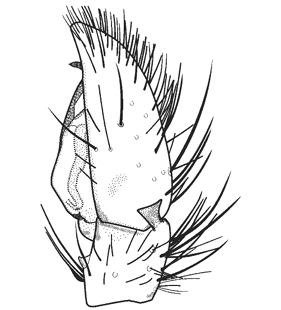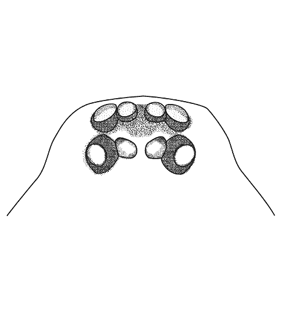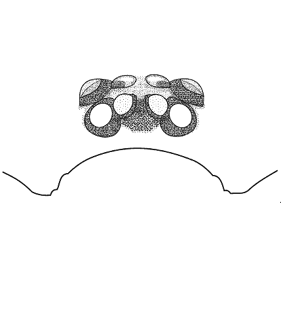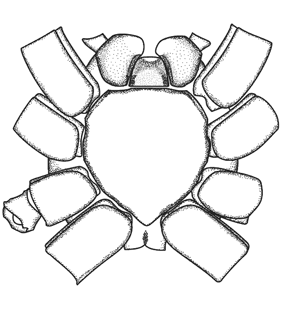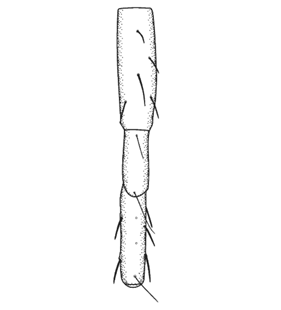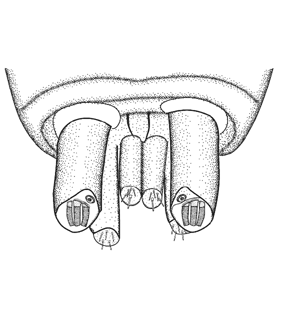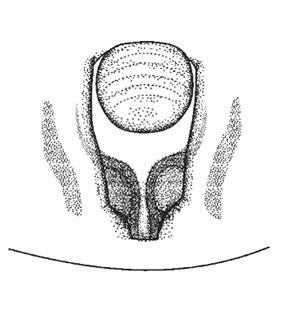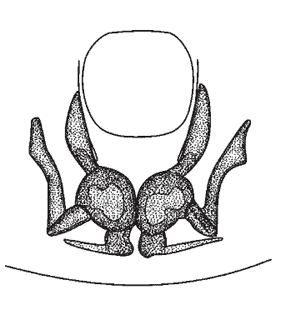Chatzakia balearica Lissner, 2016
Description
Male
Chelicera with finely serrated, retromarginal keel.
Eyes, except posterior medians, distinctly ringed with black
Eyes relatively large, separated by less than half width of eye diameter, posterior medians closer to posterior lateral eyes than to each other, lateral eyes of both rows larger than medians.
Sternum scutiform, not projecting between coxae IV. Coxae I and IV clearly longer than others.
Leg formula: IV-I-II-III. Abdomen of male with three pairs of apodemes; without scutum.
Three or four piriform spigots on anterior lateral spinnerets. All patellae with dorsal, slender macrosetae; retrolateral macrosetae absent.
No thick spines nor spine-like macrosetae on any patella.
Carapace yellow-brown, darkened at margins. Fovea short but distinct. Two prominent striae run from fovea to lateral eyes, forming two convex dark lines; faint reticulation of head region visible in preserved specimen.
Carapace covered with sparse, yellow-brown hairs; body and legs furnished with transparent brachiate setae appressed to cuticle.
Male palp simple, with short tibial apophysis and robust embolus arising from median part of bulbus; tegular and median apophyses absent.
Body length male: 3.6–4.8 mmFemale
see male.
Epigyne with large groove and anterior hood.
Body length female: 4.0–5.1 mmAdditional information
Characteristics of the genus:
Posterior eye row just slightly longer than anterior row.
All patellae with an apical macroseta in the dorsal midline and a smaller one in a basal position, without lateral or ventral macrosetae.
Body and legs with brachiate setae with 5–6 pairs of brachia originating only on basal half of the stem; 4) epigyne with a hood.
Male without scutum. Male palp simple, with embolus arising medially, not bearing median apophysis. Cymbium without strong spines.
On the forest floor of pine forests, also on a rock steppe with scattered grass tussocks. 500m.
Frequency: Rarely found
Distribution
Phenology
| Jan | Feb | Mar | Apr | May | Jun | Jul | Aug | Sep | Oct | Nov | Dec |
 |  |
Figures
Distribution List
"No references" does not mean that the species does not occur in this country, but that we have not yet inserted the reference for it. We are working on it.
References
Branco V V, Morano E, Cardoso P (2019) An update to the Iberian spider checklist (Araneae). Zootaxa 4614: 201-254 ![]()
Lissner J, Bosmans R, Hernández-Corral J (2016a) Description of a new ground spider from Majorca, Spain, with the establishment of a new genus Chatzakia n. gen. (Araneae: Gnaphosidae). Arachnology 17: 142-146 ![]()
WSC (2025) World Spider Catalog. Version 26. Natural History Museum Bern, online at http://wsc.nmbe.ch (28.2.2025) doi: 10.24436/2 ![]()
